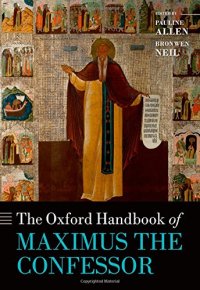
Ebook: The Oxford Handbook of Maximus the Confessor
Author: Pauline Allen Bronwen Neil
- Tags: Church History Churches Leadership Historical Theology Biblical Culture Christianity Religious World Religion Spirituality Agnosticism Atheism Buddhism Hinduism Islam Judaism Literature Fiction New Age Other Eastern Religions Sacred Texts Practices Art Studies Supernatural Paranormal Worship Devotion Africa Ancient Asia Europe Latin America Middle East Military United States Humanities Used Rental Textbooks Specialty Boutique
- Series: Oxford Handbooks
- Year: 2015
- Publisher: Oxford University Press
- Edition: 1
- Language: English
- pdf
Maximus the Confessor (c.580-662) has become one of the most discussed figures in contemporary patristic studies. This is partly due to the relatively recent discovery and critical edition of his works in various genres, including On the Ascetic Life, Four Centuries on Charity, Two Centuries on Theology and the Incarnation, On the 'Our Father', two separate Books of Difficulties, addressed to John and to Thomas, Questions and Doubts, Questions to Thalassius, Mystagogy and the Short Theological and Polemical Works.
The impact of these works reached far beyond the Greek East, with his involvement in the western resistance to imperial heresy, notably at the Lateran Synod in 649. Together with Pope Martin I (649-53 CE), Maximus the Confessor and his circle were the most vocal opponents of Constantinople's introduction of the doctrine of monothelitism. This dispute over the number of wills in Christ became a contest between the imperial government and church of Constantinople on the one hand, and the bishop of Rome in concert with eastern monks such as Maximus, John Moschus, and Sophronius, on the other, over the right to define orthodoxy. An understanding of the difficult relations between church and state in this troubled period at the close of Late Antiquity is necessary for a full appreciation of Maximus' contribution to this controversy.
The editors of this volume provide the political and historical background to Maximus' activities, as well as a summary of his achievements in the spheres of theology and philosophy, especially neo-Platonism and Aristotelianism.
The impact of these works reached far beyond the Greek East, with his involvement in the western resistance to imperial heresy, notably at the Lateran Synod in 649. Together with Pope Martin I (649-53 CE), Maximus the Confessor and his circle were the most vocal opponents of Constantinople's introduction of the doctrine of monothelitism. This dispute over the number of wills in Christ became a contest between the imperial government and church of Constantinople on the one hand, and the bishop of Rome in concert with eastern monks such as Maximus, John Moschus, and Sophronius, on the other, over the right to define orthodoxy. An understanding of the difficult relations between church and state in this troubled period at the close of Late Antiquity is necessary for a full appreciation of Maximus' contribution to this controversy.
The editors of this volume provide the political and historical background to Maximus' activities, as well as a summary of his achievements in the spheres of theology and philosophy, especially neo-Platonism and Aristotelianism.
Download the book The Oxford Handbook of Maximus the Confessor for free or read online
Continue reading on any device:

Last viewed books
Related books
{related-news}
Comments (0)